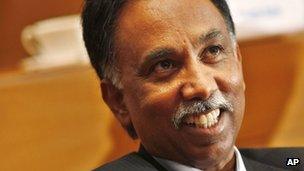Healthy people create economic health
- Published

Increasing exercise is a good way to help prevent illness and therefore reduce healthcare budgets
Davos is a picture of health.
Across the road from the World Economic Forum, a group of children are braving the cold in the ice hockey rink.
The scene is framed by a mountain range that is home to one of Switzerland's best and biggest ski resorts.
As such, the town could be seen as a blueprint for a future where sickness and disease gives way to healthy, active and wealthy lives.
But leave the snow-covered valley and enter the real world, and it soon becomes apparent that the present is very different.
Healing the economy
In the present, wealth is being squandered on a system that a chief executive of a European pharmaceutical company describes as "a sick system rather than a health system".
In fact, treating the sick and the injured, the old and the infirm, is so expensive that it has become a massive barrier to politicians' and business leaders' efforts to nurse the economy back to health.
"Disease is the most cost-ineffective thing we do today," says an American professor of medicine and engineering.
The system is inefficient, adds a medical diagnostics investor, especially in the US where it accounts for some 18% of government spending - twice that in most Western European countries, and about 20 times more than in many developing countries.

S D Shibulal wants healthcare to become "more preventive, more affordable, and more personalised"
Health is the only big-ticket expense item in the US budget that is growing, so it is not only crippling for the economy, but on its way to become unaffordable too, he says.
"Sort out the inefficiencies in US healthcare," the investor insists, "and we can repay half the $1tn (£637bn) deficit in a decade."
Failure to do so, adds the pharma-chief, could threaten the very solvency of many a healthcare system, even in developed nations in Europe and the US.
Technology is key
"Healthcare must become more preventive, more affordable, and more personalised," says S D Shibulal, chief executive and managing director of the Indian technology company Infosys, in an interview with BBC News.
And to achieve all this, technology is key, he insists.
That might sound like the voice of vested interest, but during sessions at this year's World Economic Forum, the view is shared by government ministers and regulators, pharmaceutical and medical diagnostics companies, as well as healthcare operators and private investors.
"Digital health is part of the solution," according to one European minister of health. "Some 20%-40% of healthcare spending is wasted due to lack of information."
Engage and empower
Investing in technology is a clever way to get more bang for each buck, the speakers agree.
And the opportunities are almost limitless, ranging from the creation of apps that help people explore health issues on their electronic gadgets, to analysis software for biological data that helps improve the understanding of how the body responds to disease, to kit that makes diagnosis more accurate.

The speakers at the talk at Davos did not agree on how people should be helped to improve their health
"Medical diagnostics equipment accounts for just 1.5% of healthcare spending in the US, yet it forms the basis for 80% of decisions taken by doctors," says the chief executive of a medical diagnostics company. "That cannot be right."
One academic from a leading US university says technology can engage and empower patients.
For instance, someone with fever could use a disposable kit to test saliva to find out what is wrong with them.
The data from the test would go to a national database for research purposes. It would also go to that person's electronic medical folder, where the computer works out what sort of drugs to subscribe based on medical history, other medications taken and so on.
Less ambitious projects could be, say, online health education via Skype for villagers in rural India or Africa, perhaps by charitable volunteers in developed nations, or remote diagnostics aided by camera phones, Mr Shibulal suggests.
As the spectrum of technologies applied to solve health issues broadens, it could combine to discover disease early when it is cheaper and easier to treat, reduce the use of expensive medication in cases where it has little effect, ensure patients get the right dosage of drugs, improve research into preventative medicine, vaccines and treatment.
Much of the data gathering is happening already, according to the medical diagnostics chief.
"In the last two years we've probably collected more data than we had in a lifetime before," he says.
This, off course, raises questions about data protection, but this is a matter of mindsets rather than of technology, according to several speakers, who seem convinced that people will accept that the benefits outweigh the risks.
Fit and healthy
Technology without behavioural and cultural change will not be enough, the Davos delegates agree.
"Society as a whole needs to stay more healthy, eat more healthy, take exercise, and get enough rest, including sleep," says the chief executive of an Asian pharmaceutical company.
The Davos speakers do not agree on how people should be made to do what is best for them, however.
Some, such as the investor, would like to see people pay directly for their healthcare because he believes this would make them realise that it would be cheaper for them to exercise than to pay for operations or insurance.
Others, such as the European health minister, see it as a societal challenge that should be met with schemes that encourage people to cycle to work or walk to school, or by subsidising sports centres such as Davos's Tourism und Sportzentrum.
"Everybody agrees on the destination, but they may not agree on which path to take to get there," laments Mr Shibulal.
"It is a multi-stakeholder challenge, so it is going to take time."
You can follow Jorn's coverage from Davos on Twitter @jornmadslien.